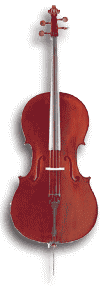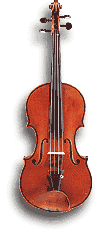




Franz Joseph Haydn (1732-1809)
The classical music composer, Franz Haydn, is described in detail here; Haydn's life and music, in classical midi music form, is here for you. Midi music of Haydn, and Haydn's life story...for you.
 Born in Rohrau, Austria in 1732 (the same year as George Washington) to a peasant
family, Franz Joseph Haydn showed musical talent at an early age. He studied music with
a relative, Johann Franck, and was playing the violin and organ - and singing in the church
choir - by the time Haydn was six. When he was eight, Haydn was recruited by the St. Stephen's
Cathedral in Vienna to sing in their choir. In Vienna, he continued to study violin and
voice, and began to teach himself the rudiments of composition. When his voice broke at
seventeen, he was kicked out of the choir, and he began to teach the clavier and play with
street musicians for his daily bread. So great was his facility on the keyboard that he
started to teach, all the while continuing his self-structured education in composition. His
progress was rapid, and in 1759, Haydn was appointed Chapelmaster and Composer to the
court of the Bohemian Count Morzin. His first symphonies were composed for the
orchestra of that court.
Born in Rohrau, Austria in 1732 (the same year as George Washington) to a peasant
family, Franz Joseph Haydn showed musical talent at an early age. He studied music with
a relative, Johann Franck, and was playing the violin and organ - and singing in the church
choir - by the time Haydn was six. When he was eight, Haydn was recruited by the St. Stephen's
Cathedral in Vienna to sing in their choir. In Vienna, he continued to study violin and
voice, and began to teach himself the rudiments of composition. When his voice broke at
seventeen, he was kicked out of the choir, and he began to teach the clavier and play with
street musicians for his daily bread. So great was his facility on the keyboard that he
started to teach, all the while continuing his self-structured education in composition. His
progress was rapid, and in 1759, Haydn was appointed Chapelmaster and Composer to the
court of the Bohemian Count Morzin. His first symphonies were composed for the
orchestra of that court.In 1761 - amidst a disappointing marriage - Haydn was appointed Music Director to Prince Esterhazy, a Hungarian nobleman; he was to remain in this job for three decades, composing for court ensembles, training singers, and generally improving the court's musical standards. Haydn's reputation as a composer - fueled by the popular success of his numerous symphonies, among other works - spread all over Europe, and upon the death of his second Esterhazy employer, he moved to Vienna, where he befriended Mozart and taught composition to the young Ludwig van Beethoven. Several trips to England followed, and his symphonies were lauded there as much as they had been on the continent. Following the popular taste, Haydn began to write oratorios and masses. He died in 1809, an esteemed father of the Classical style.
Haydn is well-known for his symphonies, which number 104 in total; perhaps more
significant, however, was his work in chamber music.  He is generally considered to be the
father of the modern string quartet; the 84 quartets Haydn created are masterpieces of
structure and craft, and laid the groundwork for the works of Mozart and Beethoven
which were to follow later in the Classical period. Haydn developed the quartet form from
the existing divertimento to a mature genre, according each instrument an equal,
sophisticated voice and imbuing the form with substance, architecture and grace. His
quartets were inspirations for other composers - Mozart often referred to Haydn's work
as the standard by which all chamber music was measured. Haydn's masses and
oratorios, although not as oft-played as his instrumental ensemble works, are equally
stunning in their craft.
He is generally considered to be the
father of the modern string quartet; the 84 quartets Haydn created are masterpieces of
structure and craft, and laid the groundwork for the works of Mozart and Beethoven
which were to follow later in the Classical period. Haydn developed the quartet form from
the existing divertimento to a mature genre, according each instrument an equal,
sophisticated voice and imbuing the form with substance, architecture and grace. His
quartets were inspirations for other composers - Mozart often referred to Haydn's work
as the standard by which all chamber music was measured. Haydn's masses and
oratorios, although not as oft-played as his instrumental ensemble works, are equally
stunning in their craft.
 Guitar Quartet in D, Allegro Guitar Quartet in D, Allegro |
 Symphony No.2 in D, Allegro spiritoso Symphony No.2 in D, Allegro spiritoso |
[Top of Page]
Copyright © 1998 by Mr. Maestro, All Rights Reserved.





